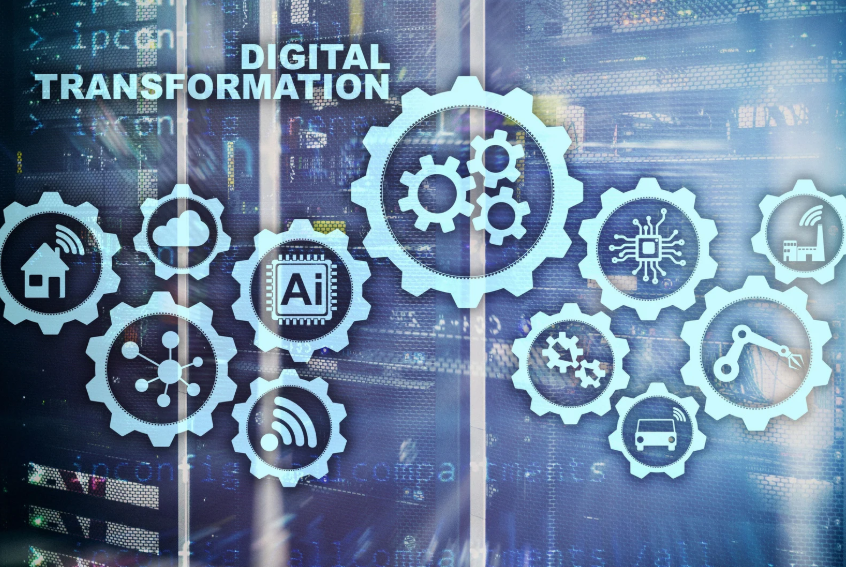Digital Transformation with AI is reshaping industries, enabling businesses to leverage data analytics for smarter decision-making, improved efficiency, and enhanced customer experiences. As companies navigate an increasingly competitive landscape, integrating artificial intelligence into their digital transformation strategies has become essential. Digital Transformation with AI helps organizations harness the power of automation, machine learning, and predictive analytics to drive sustainable growth and innovation.
Understanding Digital Transformation
Digital Transformation with AI refers to the integration of advanced technologies into business processes to improve operations and customer engagement. It involves adopting cloud computing, IoT, and AI-driven analytics to enhance productivity. Companies that successfully undergo Digital Transformation with AI gain a competitive edge by optimizing processes, reducing costs, and making data-driven decisions that foster long-term growth.
The Power of AI in Digital Transformation
Digital Transformation with AI empowers businesses by automating repetitive tasks, improving efficiency, and providing predictive insights. AI-powered chatbots enhance customer support, while machine learning algorithms analyze consumer behavior to personalize marketing strategies. Additionally, AI-driven automation optimizes supply chain management, ensuring smooth operations and timely deliveries. Digital Transformation with AI not only streamlines workflows but also fosters innovation by identifying new revenue opportunities through data analysis.
The Role of Data Analytics in Business Growth
Digital Transformation with AI is incomplete without data analytics, as data serves as the foundation for AI-driven decision-making. Companies use data analytics to track key performance indicators (KPIs), identify market trends, and anticipate customer needs. Descriptive analytics provides insights into past business performance, while predictive analytics forecasts future trends. With prescriptive analytics, businesses can make data-backed decisions to maximize efficiency. By integrating Digital Transformation with AI, organizations gain a holistic view of their operations, enabling continuous improvement and strategic planning.
AI and Data Analytics: A Winning Combination
Digital Transformation with AI and data analytics creates a powerful synergy that enhances business operations. AI algorithms process vast amounts of data, uncovering patterns that humans might overlook. In the retail sector, AI-driven analytics helps predict consumer preferences, leading to personalized recommendations. In healthcare, AI assists in diagnosing diseases based on medical imaging analysis. Meanwhile, financial institutions leverage AI and data analytics to detect fraudulent transactions and assess credit risks. Digital Transformation with AI allows businesses across various industries to make informed, data-driven decisions that propel growth.
Challenges in AI-Driven Digital Transformation
Despite the benefits, Digital Transformation with AI comes with challenges. One major obstacle is data privacy and security concerns, as businesses must comply with regulations such as GDPR and CCPA. Additionally, integrating AI into existing IT infrastructure requires significant investment and expertise. Many organizations also face a skills gap, as AI implementation necessitates trained professionals who can manage data and develop AI models. Overcoming these challenges involves investing in cybersecurity, upskilling employees, and adopting scalable AI solutions to facilitate seamless Digital Transformation with AI.
Steps to Implement AI and Data Analytics in Your Business
For successful Digital Transformation with AI, businesses must follow a structured approach:
- Set Clear Objectives: Define specific goals for AI implementation, such as enhancing customer experience or improving operational efficiency.
- Invest in the Right AI Tools: Choose AI-powered platforms that align with business needs, such as machine learning software, cloud analytics, or natural language processing tools.
- Build a Data-Driven Culture: Encourage employees to embrace data analytics and AI-driven insights in decision-making processes.
- Ensure Data Quality: Collect and clean high-quality data to improve the accuracy of AI models.
- Monitor and Optimize: Continuously analyze AI performance and refine strategies to maximize the impact of Digital Transformation with AI.
Future Trends: AI and Data Analytics in Digital Transformation
As businesses continue embracing Digital Transformation with AI, several emerging trends are shaping the future:
- AI-Driven Automation: More companies are leveraging AI to automate complex processes, from supply chain management to financial forecasting.
- Edge AI: AI-powered analytics on edge devices reduces latency and enhances real-time decision-making.
- Explainable AI: Businesses are focusing on AI transparency to improve trust and regulatory compliance.
- AI for Sustainability: Companies are integrating AI and data analytics to optimize energy consumption and reduce carbon footprints. Digital Transformation with AI will continue evolving, driving innovation and redefining business models.
Takeaway
Digital Transformation with AI is a game-changer for businesses seeking growth, efficiency, and a competitive edge. By leveraging AI-powered data analytics, companies can make informed decisions, automate operations, and enhance customer experiences. Although challenges exist, businesses that invest in the right AI strategies and embrace a data-driven culture will thrive in the digital age. As AI technology continues to advance, organizations must proactively adapt to harness the full potential of Digital Transformation with AI, ensuring long-term success in an ever-evolving marketplace.











